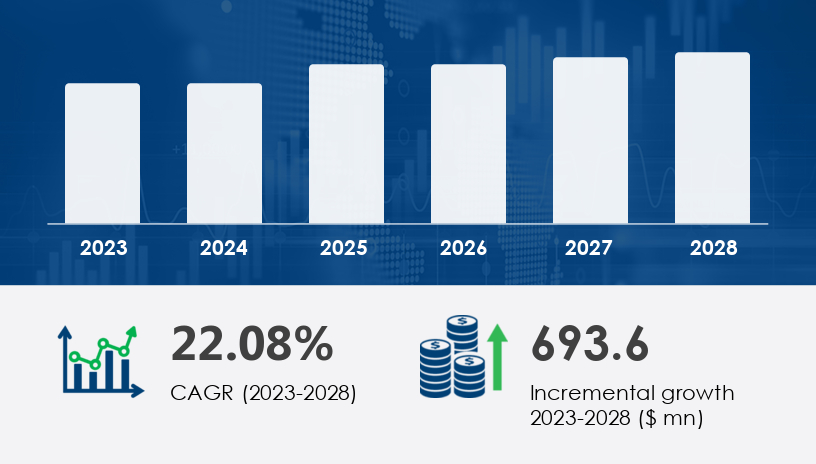Automotive LiDAR Sensors Market Analysis 2024-2028
The automotive lidar sensors market is forecast to grow by USD 693.6 million at a CAGR of 22.08% from 2023 to 2028, driven by advancements in autonomous vehicle technology. LiDAR sensors are crucial for the development of autonomous vehicles, providing real-time 3D point cloud data for environmental perception. With the integration of remote sensing technology, the market is witnessing a rise in demand for safer and more efficient transportation solutions.

For more details about the industry, get the PDF sample report for free
Market Segmentation:
By Application:
By Technology:
- Solid-state
- Electro mechanical
By Geography:
- North America
- Europe
- APAC
- Middle East and Africa
- South America
Key Market Drivers:
- Autonomous vehicle technology advancements: Companies like Delphi, Continental, Bosch, Daimler, Scania, and Volvo are pushing the development of autonomous driving, broadening the acceptance of semi-autonomous features in passenger and commercial vehicles. Infineon Technologies AG’s integration of the AURIXTM microcontroller family, especially the TC4x series, is supporting the use of LiDAR in autonomous vehicles.
- Increase in ADAS and telematics: The expansion of advanced driver-assistance systems (ADAS) and telematics in vehicles is accelerating the demand for LiDAR sensors. The adoption of systems such as adaptive front lights, adaptive cruise control, and collision warning systems is growing.
Market Trends:
- Cost reduction of LiDAR sensors: Manufacturers are focusing on lowering the costs of LiDAR sensors by integrating all components onto a single chip, leveraging vertical integration. This trend will make LiDAR technology more accessible, especially for Hybrid Battery Electric Vehicles (HEVs).
- Technological advancements: LiDAR technology is continuously evolving with innovations in design, sensor integration, and performance in adverse weather conditions like fog and rain. Companies, including DARPA-backed manufacturers, are contributing to these advancements.
Market Challenges:
- High costs of LiDAR sensors: The high price point of LiDAR sensors remains a significant challenge, though companies like Ouster and Luminar are working on solutions to make sensors more affordable. Ouster’s ES2 sensor is expected to be ready for mass production by 2024 at a cost of USD 600, with a predicted drop to USD 100 in subsequent years.
Get more details by ordering the complete report
Key Companies in the Automotive Lidar Sensors Market
Some of the key companies of the Automotive Lidar Sensors Market are as follows:
- Benewake Beijing Co. Ltd
- Cepton Inc.
- Continental AG
- DENSO Corp.
- HELLA GmbH and Co. KGaA
- Ibeo Automotive Systems GmbH
- Infineon Technologies AG
- Innoviz Technologies Ltd.
- LeddarTech Inc.
- Leishen Intelligent Systems Co. Ltd.
- Lumibird Canada
- Luminar Technologies Inc.
- Ouster Inc.
- Quanergy Systems Inc.
- TE Connectivity Ltd.
- TetraVue Inc.
- Valeo SA
- Velodyne Lidar Inc.
- ZF Friedrichshafen AG